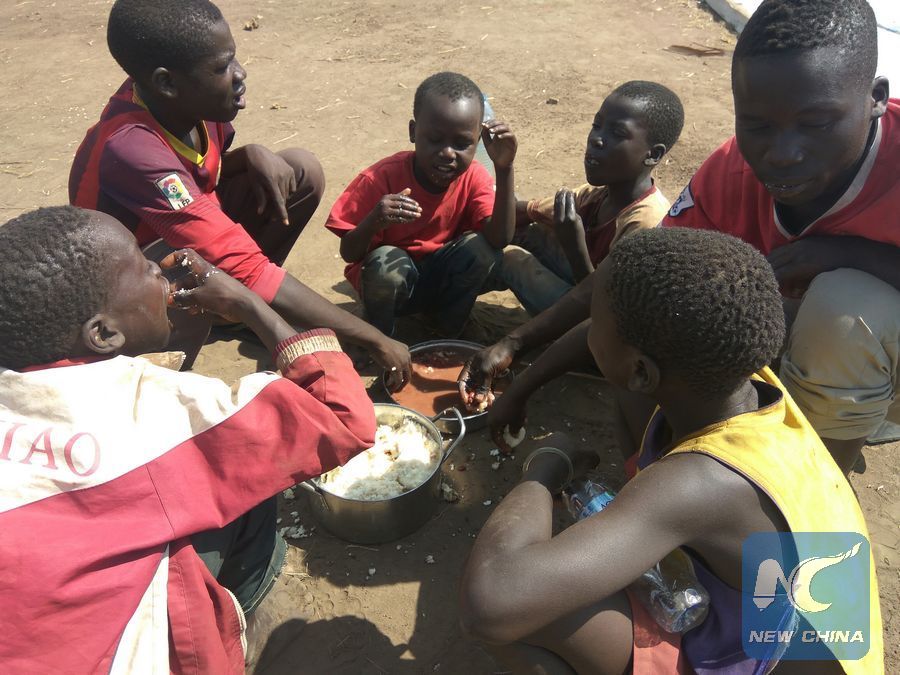
South Sudan refugee children share a meal at Uganda's newly opened Palabek Refugee Settlement in the northern part of the country, April 13, 2016. Fighting that occurred about two weeks ago between government troops and the rebels forced over 5,000 South Sudanese to flee to the northern Ugandan district of Lamwo. Uganda has called for international assistance to help cater for the increasing number of South Sudan refugees. (Xinhua/Ronald Ssekandi)
by Ronald Ssekandi and Yuan Qing
YUMBE, Uganda, April 17 (Xinhua) -- Uganda is paying the price of having an open refugee policy that has attracted thousands of refugees from neighboring countries.
The east African country has the biggest Refugee Settlement in the world, hosting over 270,000 South Sudanese refugees. The country is host to over 1.5 million refugees from neighboring countries.
Once a refugee arrives in Uganda and goes through the necessary documentations, he or she is allocated a piece of land where they can cultivate their own food instead of entirely depending on relief especially in the face of dwindling financial support to humanitarian agencies.
The country last year announced that refugees will be allowed to work to gain income to cater for their families. The skills gained would also be helpful when they return home.
All these measures are geared towards empowering refugees to become self-reliant and reduce their dependence on humanitarian aid.
These measures are summed up in the country's five-year 350 million U.S. dollar project dubbed Refugee and Host Population Empowerment.
The project has already received endorsements from the United Nations High Commissioner for Refugees (UNHCR).
UNHCR head Filippo Grandi on a visit to the refugee settlements in northern Uganda last year, he urged the world to embrace the policy noting that it can be a global model on refugee management and response in the longer term.
Since then, Uganda and humanitarian agencies have been calling for support but it has not been coming in as expected.
Uganda is now arguing that it is at a breaking point because the influx of refugees is already putting pressure on the meagre resources government has to cater for the rest of its citizens.
Experts are now arguing that the world should come to the rescue of Uganda noting that the country should not pay the price for being good to refugees.
Wellington Carneiro, who has experience with working on humanitarian crises in Chad, Cameroon, Sudan argues that the world should not let Uganda's policy die off.
"Uganda has turned out to be the biggest refugee host country in Africa with over 1.3 million refugees. Uganda needs support and this operation is critically underfunded," Carneiro told Xinhua in an interview at Ngomoromo, a border post between Uganda and South Sudan through which refugees are fleeing to Uganda. Carneiro works for the UNHCR as a field officer at Ngomoromo.
Gilbert Kamanga, National Director, World Vision Uganda argues that if the international community is hailing Uganda for its open refugee policy, it should be able to fund it because the policy is an example to the world.
"In Uganda, we have a better model that can work for both the host community and the refugees because this problem is not coming to an end soon. The international community should think and act responsibly," Kamanga said.
He said in the face of dwindling international support to humanitarian crises, the Uganda model is critical in ensuring self-sustenance.
Uganda's refugee policy is perhaps an example to the world on how to manage the refugee question if the world is for a bright future.

